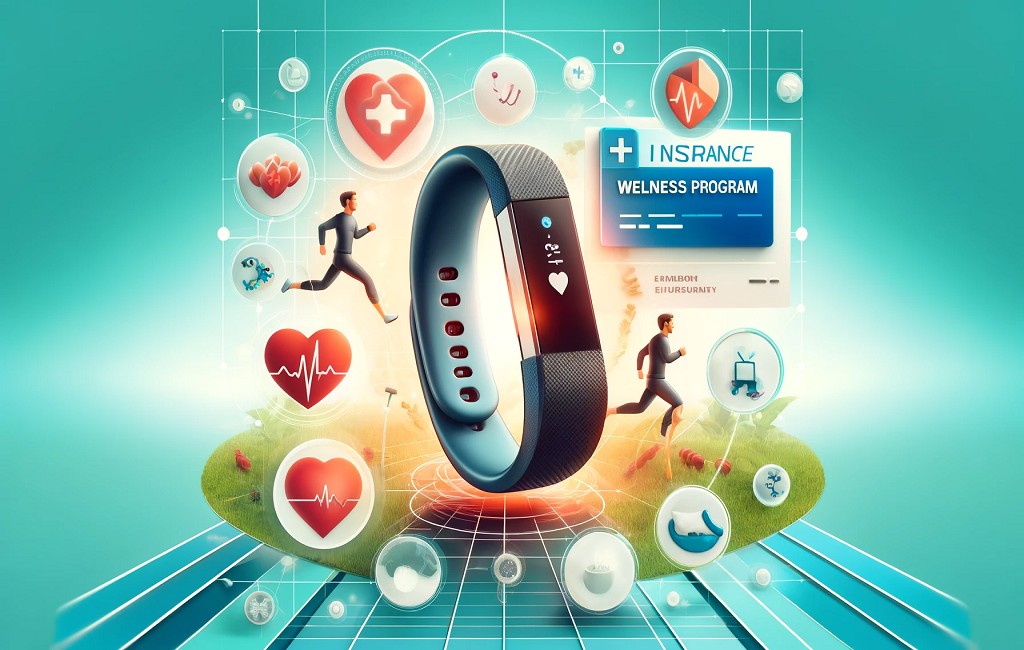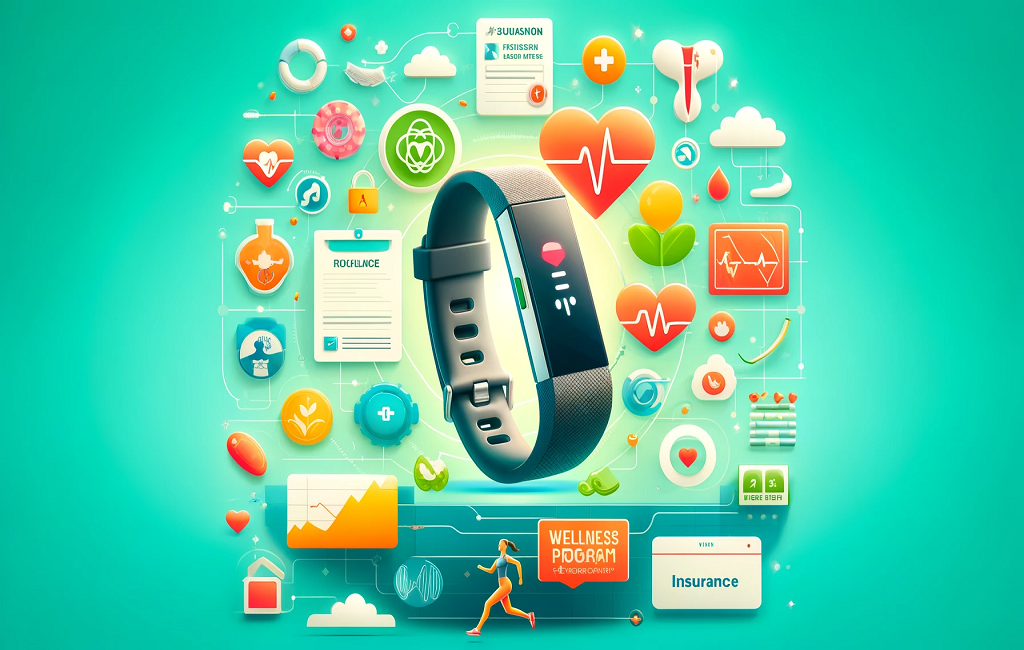
Fitness trackers like Fitbit have revolutionized how we monitor and manage our health. These devices, which range from simple pedometers to advanced smartwatches, provide invaluable insights into our daily activity levels, heart rate, sleep patterns, and overall fitness. As healthcare costs continue rising, many individuals seek affordable ways to maintain their health and well-being. Obtaining a free Fitbit through insurance is an attractive option that has gained popularity.
Insurance companies have recognized the benefits of promoting healthy lifestyles among their policyholders. By offering fitness trackers like Fitbit as part of their wellness programs, these companies aim to encourage regular physical activity, leading to better health outcomes and reduced healthcare costs. This comprehensive guide will explore how you can get a free Fitbit through insurance. We’ll cover the role of insWe’lle companies in wellness programs, the types of fitness trackers they cover, eligibility criteria, and a step-by-step guide to securing your free Fitbit. Additionally, we’ll share a personal opinion on the value of fitness trackers in modern health management and address common questions in our FAQ section.
Whether you’re looking to improve your fitness, track your health metrics more effectively, or take advantage of the benefits offered by your insurance provider, this article will provide you with the information you need to get started. Let’s dive in and discover that you can get a free Fitbit through insurance and start your journey towards a healthier lifestyle.

Table of Contents
Understanding Fitness Trackers and Their Benefits
Like the popular Fitbit, fitness trackers have become indispensable tools for individuals looking to monitor and improve their health. These wearable devices are designed to track various aspects of physical activity and health metrics, providing users with real-time data and insights. In this section, we will delve into what fitness trackers are, how they work, and the numerous benefits they offer.
What Are Fitness Trackers?
Fitness trackers are wearable devices with sensors that monitor various physical activities and physiological metrics. They typically come in wristbands, smartwatches, or clip-on devices. The most common features of fitness trackers include:
- Step Counting: Measures the number of steps taken throughout the day.
- Heart Rate Monitoring: Tracks your heart rate during rest and physical activity.
- Sleep Tracking: Analyzes your sleep patterns, including duration and quality.
- Calorie Burn Estimation: Estimates the number of calories burned based on activity levels.
- Distance Tracking: Measures the distance covered during walking, running, or cycling.
- Activity Recognition: Automatically detects and records different types of physical activities.
Advanced fitness trackers, such as smartwatches, may also offer additional features like GPS tracking, smartphone notifications, and the ability to monitor specific workouts and sports activities.
How Do Fitness Trackers Work?
Fitness trackers use a combination of sensors and algorithms to collect and analyze data. The most common sensors include accelerometers, which detect movement, and optical sensors, which measure heart rate by shining light into the skin and detecting changes in blood volume. These devices often sync with a smartphone app or a computer, allowing users to view and analyze their data in detail.
The data collected by fitness trackers is processed using algorithms that convert raw sensor readings into meaningful information, such as the number of steps taken, heart rate trends, and sleep stages. This information is presented intuitively to users, helping them understand their activity levels and health metrics.
Benefits of Using Fitness Trackers
Fitness trackers offer many benefits that can contribute to a healthier and more active lifestyle. Some of the key benefits include:
- Increased Awareness of Activity Levels: Fitness trackers provide real-time feedback on your daily activity levels, helping you understand how much you move and encouraging you to stay active.
- Motivation to Achieve Goals: Many fitness trackers allow you to set personal goals, such as reaching a certain number of steps per day or burning a specific number of calories. The device’s reminders and programs can help keep you motivated to achieve these goals.
- Improved Heart Health: Regular heart rate monitoring can help you understand cardiovascular health. By tracking your heart rate during exercise, you can ensure you’re working out at an activity that benefits your heart.
- Better Sleep Quality: Sleep tracking features provide insights into your sleep patterns, helping you identify factors affecting your sleep quality. This information can be used to make adjustments to improve your overall rest and recovery.
- Personalized Health Insights: The data collected by fitness trackers can be analyzed to provide personalized health insights and recommendations. This can help you make informed decisions about your fitness and lifestyle.
- Encouragement to Stay Active: Fitness trackers often include features like reminders to move, which prompt you to take short breaks and stay active throughout the day. This can be particularly beneficial for individuals with sedentary lifestyles.
In summary, fitness trackers like Fitbit are potent tools that offer numerous benefits for monitoring and improving health. These devices can help individuals stay motivated, achieve their fitness goals, and lead healthier lives by providing real-time data and personalized insights.
How Insurance Companies Promote Health and Fitness
Insurance companies have recognized the importance of promoting health and fitness among their policyholders. By encouraging healthier lifestyles, they can improve overall public health and reduce healthcare costs. Insurance companies achieve this through wellness programs that often include incentives like free or discounted fitness trackers. In this section, we will explore the role of insurance companies in promoting health and fitness, the types of fitness trackers they cover, and the benefits of these wellness programs.
Role of Insurance Companies in Wellness Programs
Insurance companies are pivotal in promoting health and fitness by implementing comprehensive wellness programs. These programs encourage policyholders to adopt healthier habits and exercise regularly. These programs include:
- Preventive Health Care: Wellness programs aim to prevent chronic diseases such as obesity, diabetes, and cardiovascular conditions by promoting regular physical activity and healthy lifestyle choices.
- Cost Reduction: Healthier policyholders tend to have lower healthcare costs, resulting in savings for insurance companies and insured individuals. Reduced medical claims lead to lower premiums and out-of-pocket expenses.
- Improved Customer Engagement: Wellness programs that offer tangible rewards, such as fitness trackers, increase customer satisfaction and engagement. Policyholders feel more connected to their insurance providers and perceive added value in their coverage.
Insurance companies offer various incentives and resources to achieve these goals, including fitness challenges, educational materials, and personalized health coaching. One of the most popular incentives is providing free or discounted fitness trackers like Fitbit to policyholders who participate in these programs.
Types of Fitness Trackers Covered
Insurance companies typically offer a range of fitness trackers as part of their wellness programs. The selection may vary based on the insurance provider and the specific program, but some of the commonly covered devices include:
- Fitbit: Known for its user-friendly interface and comprehensive tracking capabilities, Fitbit devices are a popular choice among insurance companies. Models such as the Fitbit Charge, Fitbit Inspire, and Fitbit Versa are often included in wellness programs.
- Apple Watch: Some insurance providers offer discounts or reimbursements for Apple Watch purchases. The Apple Watch is renowned for its advanced health-tracking features, including ECG, fall detection, and blood oxygen monitoring.
- Garmin: Garmin fitness trackers and smartwatches are favored for their durability and accuracy. Wellness programs frequently offer models like the Garmin Vivosmart and Garmin Forerunner.
- Samsung Galaxy Watch: Samsung’s fitness trackers Samsung’swatches, such as the Galaxy Watch Active, are also included in some insurance wellness programs, providing users with comprehensive health monitoring features.
Benefits of Wellness Programs
Wellness programs that include fitness trackers offer numerous benefits for policyholders and insurance companies. Some of the key advantages include:
- Enhanced Health Monitoring: Fitness trackers provide users with real-time data on their physical activity, heart rate, sleep patterns, and more. This information helps individuals make informed decisions about their health and lifestyle.
- Increased Physical Activity: Using fitness trackers motivates policyholders to stay active by setting and tracking fitness goals. Regular physical activity is linked to improved overall health and a reduced risk of chronic diseases.
- Better Health Outcomes: Participants in wellness programs often experience better health outcomes, including weight loss, improved cardiovascular health, and enhanced mental well-being. These positive results contribute to a higher quality of life.
- Cost Savings: Healthier policyholders generate fewer medical claims, leading to cost savings for insurance companies and insured individuals. This can result in lower premiums and reduced healthcare expenses.
- Data-Driven Insights: Insurance companies can analyze the data from fitness trackers to gain insights into population health trends. This information helps them design more effective wellness programs and tailor interventions to specific needs.
In conclusion, insurance companies promote health and fitness through comprehensive wellness programs that include free or discounted fitness trackers. These programs encourage policyholders to adopt healthier lifestyles, resulting in better health outcomes and cost savings. By offering devices like Fitbit, Apple Watch, Garmin, and Samsung Galaxy Watch, insurance companies provide valuable tools that help individuals monitor and improve their health.

Eligibility Criteria for Receiving a Free Fitbit
Securing a free Fitbit through your insurance provider involves meeting specific eligibility criteria. These criteria vary depending on the insurance company and the particular wellness program they offer. This section outlines the standard eligibility requirements and details specific insurance providers’ programs.
Common Eligibility Requirements
While each insurance provider may have unique criteria for their wellness programs, there are several standard requirements that policyholders typically need to meet to qualify for a free Fitbit:
- Enrollment in a Health Plan: You must be an active member of a health insurance plan that offers wellness programs. Ensure your policy includes wellness benefits; not all plans provide these incentives.
- Participation in Wellness Programs: Most insurance companies require policyholders to enroll in wellness programs. These programs often involve regular participation in health-related activities and tracking progress using a fitness tracker provided.
- Completion of Health Assessments: Some insurers require policyholders to complete a health assessment or biometric screening. This initial evaluation helps determine your health status and sets a baseline for measuring progress.
- Engagement in Physical Activity: To qualify for a free Fitbit, you may need to meet specific activity goals. This could include reaching several daily steps, participating in fitness challenges, or logging regular workouts.
- Regular Use of the Fitness Tracker: Insurance providers often monitor the usage of the fitness tracker to ensure it is being utilized effectively. Consistent use and syncing of the device with the associated app may be required to maintain eligibility.
- Compliance with Program Guidelines: Adhering to the wellness program’s guidelines and rules is crucial. This may involve attending health workshops, following personalized fitness plans, and regularly updating your health data.
Specific Insurance Providers and Their Programs
Several major insurance providers offer wellness programs, including free or discounted fitness trackers. Here are some examples:
- UnitedHealthcare:
- Motion Program: UnitedHealthcare’s Motion program involves members walking and tracking their steps using a fitness tracker. Participants can earn credits toward their health savings account (HSA) or health reimbursement account (HRA) based on their activity levels.
- Eligibility: Active members of UnitedHealthcare who enroll in the Motion Program and meet daily walking goals.
- Aetna:
- Aetna Attain: Aetna, in collaboration with Apple, offers the Attain program, which combines health data from Apple Watch with personalized goals and rewards. Members can earn their Apple Watch by meeting activity goals over time.
- Eligibility: Aetna policyholders who download the Attain app, complete a health assessment, and engage in regular physical activity.
- Cigna:
- Cigna Health Rewards: Cigna’s wellness program discounts fitness trackers and other health-related products. Members can earn points for completing health activities and redeem them for rewards.
- Eligibility: Cigna members who participate in the Health Rewards program and accumulate points through various wellness activities.
- Humana:
- Go365: Humana’s Go365 program is a comprehensive wellness solution that includes fitness tracking, health assessments, and personalized health goals. Members can earn rewards, including discounts on fitness trackers.
- Eligibility: Humana members enrolled in Go365 who actively participate in the program and achieve health milestones.
- Blue Cross Blue Shield (BCBS):
- Blue365: BCBS members can use Blue365, a program that discounts fitness trackers, gym memberships, and other health-related products. Special promotions may include free or discounted Fitbits.
- Eligibility: BCBS policyholders who register for the Blue365 program utilize the available discounts and offers.
How to Check Your Eligibility
To determine if you qualify for a free Fitbit through your insurance provider, follow these steps:
- Review Your Health Plan: Check your health insurance policy documents or contact your insurance provider to verify if your plan includes wellness benefits and fitness tracker incentives.
- Visit the Insurance Website: Many insurance companies have dedicated wellness program pages. These pages provide detailed information about eligibility criteria, program guidelines, and how to enroll.
- Contact Customer Service: Contact your insurance company’s customer service department for specific details about their wellness programs and eligibility requirements. They can provide personalized assistance and answer any questions you may have.
- Enroll in the Program: If you meet the eligibility criteria, follow the enrollment process outlined by your insurance provider. This may involve signing up online, downloading an app, or attending an informational session.
By understanding your insurance provider’s eligibility criteria and specific requirements, you can take advantage of the opportunity to receive a free Fitbit and start your journey toward improved health and fitness.
Step-by-Step Guide to Getting a Free Fitbit Through Insurance
Securing a free Fitbit through your insurance provider involves a series of steps. By following these steps, you can fully take advantage of your insurance’s wellness program and the benefits of a fitness tracker. This section provides a detailed, step-by-step guide to help you navigate the process.
Step 1: Research Your Insurance Provider
The first step is determining if your insurance provider offers wellness programs, including free or discounted fitness trackers. Here’s how you can start:
- Here Policy Documents: Review your health insurance policy documents for any mention of wellness programs or fitness tracker incentives.
- Visit the Insurance Company’s Website: Most insurance companies have a wellness program section. Look for information about health incentives, wellness programs, or fitness tracker benefits.
- Contact Customer Service: If unsure, call your insurance provider’s customer service provider. Ask specifically about programs that offer free or discounted fitness trackers like Fitbit.
Step 2: Verify Your Eligibility
Once you have identified that your insurance provider offers a program with fitness tracker incentives, verify your eligibility. Common requirements include:
- Being an Active Policyholder: Ensure your insurance policy is current and active.
- Meeting Health Criteria: Some programs may require completing a health assessment or biometric screening.
- Participation in Wellness Programs: You may need to enroll in a wellness program and participate in health-related activities.
Step 3: Enroll in the Wellness Program
If you meet the eligibility criteria, the next step is to enroll in the wellness program. Here’s what you need to do:
- Complete Enrollment Forms: Fill out any necessary enrollment forms provided by your insurance company.
- Download Relevant Apps: Some programs require you to use specific apps to track your activity. Download and set up these apps on your smartphone.
- Submit Required Information: Provide any required health information or complete a health assessment.
Step 4: Select Your Fitness Tracker
Once enrolled, you may have the option to choose from a selection of fitness trackers. Here’s how to proceed:
- ReviHere ‘silable Devices: Check which fitness tracker models are available through your wellness program. Options often include popular models like Fitbit, Apple Watch, and Garmin.
- Choose Your Device: Select the fitness tracker that best suits your needs and preferences. Consider factors such as features, design, and compatibility with your smartphone.
- Order Your Tracker: Follow the instructions provided by your insurance company to order your selected fitness tracker. This may involve ordering online through a specific portal or receiving a voucher to redeem at a retailer.
Step 5: Start Using Your Fitness Tracker
After receiving your fitness tracker, it’s time to start using it to track your health and fitness activities. Here’s how to make the most new device:
- Set Up the Device: Follow the setup instructions included with your fitness tracker. Sync it with the relevant app on your smartphone.
- Track Your Activity: Use the fitness tracker to monitor your daily steps, heart rate, sleep patterns, and other health metrics. Ensure you wear it consistently to get accurate data.
- Participate in Wellness Activities: Engage in the wellness activities and challenges outlined by your insurance provider. This could include meeting daily step goals, participating in fitness challenges, or logging workouts.
Step 6: Regularly Sync and Monitor Progress
Consistently using and syncing your fitness tracker is crucial for maintaining your eligibility and maximizing the benefits of the wellness program. Here’s what to do:
- Sync RegHere’s: Sync your fitness tracker with the app regularly to ensure your activity data is up-to-date.
- Monitor Your Progress: Check your app frequently to monitor your progress toward your health and fitness goals. Use the insights provided to make informed decisions about your lifestyle.
- Engage with Program Resources: Take advantage of any additional resources offered by the wellness program, such as health coaching, educational materials, and community support.
Step 7: Maintain Compliance with Program Guidelines
Staying compliant with the program guidelines is essential to continue enjoying the benefits of the wellness program and your fitness tracker. Here’s how:
- Follow the program. Here’s how: Adhere to the rules and guidelines set forth by your insurance provider’s wellness program. These include regular participation in activities and keeping your health data up-to-date.
- Attend Required Sessions: If your program includes workshops or coaching sessions, attend them as required.
- Provide Feedback: Participate in any surveys or feedback opportunities to share your experiences and suggestions for program improvements.
Following these steps can help you successfully obtain a free Fitbit through your insurance provider and take proactive steps toward improving your health and fitness. Regularly using your fitness tracker and active participation in the wellness program can lead to significant health benefits and a more active lifestyle.

Other Ways to Get a Free or Discounted Fitbit
While obtaining a free Fitbit through insurance is a fantastic option, there are several other ways to get a free or discounted Fitbit. These methods often involve participating in wellness initiatives, taking advantage of corporate programs, or leveraging special promotions. This section will explore various alternative avenues to acquire a Fitbit without breaking the bank.
Corporate Wellness Programs
Many companies recognize the benefits of promoting health and wellness among their employees. Corporate wellness programs often include incentives such as free or discounted fitness trackers to encourage employees to stay active and healthy. Here’s how you can take advantage of these programs:
- Check with Your Employer: Inquire with your HR department or wellness program coordinator to see if your company offers a wellness program that includes fitness trackers.
- Participate in Wellness Challenges: Engage in company-sponsored wellness challenges or health initiatives. Completing these challenges may earn you rewards, including a free or discounted Fitbit.
- Utilize Employee Discounts: Some companies offer employee discounts on fitness trackers through partnerships with health and wellness retailers.
Health and Wellness Challenges
Various organizations and communities host health and wellness challenges that offer fitness trackers as prizes. These challenges motivate participants to improve their health through friendly competition. Here are some ways to get involved:
- Join Community Challenges: Look for local health organizations or community centers that host fitness challenges. Participating in these events may allow you to win a free Fitbit.
- Online Fitness Competitions: Participate in online fitness challenges and competitions. Websites and social media platforms often host challenges with fitness trackers as rewards for top performers.
- Non-Profit and Charity Events: Many non-profit organizations host wellness events and challenges to promote healthy living. Participating in these events may provide opportunities to win or receive a discounted Fitbit.
Special Promotions and Discounts
Fitness tracker manufacturers and retailers frequently run special promotions and discounts, making purchasing a Fitbit at a lower cost easier. Here’s how to find these deals:
- Manufacturer Promotions: Check Fitbit’s official website and social media channels for special promotions, discounts, and limited-time offers.
- Retailer Sales: Major retailers like Amazon, Best Buy, and Walmart often have sales on fitness trackers, especially during the holiday seasons, Black Friday and Cyber Monday.
- Newsletter Subscriptions: Subscribe to newsletters from fitness tracker brands and retailers to receive notifications about upcoming sales and exclusive discounts.
Health Insurance Rebates and Incentives
In addition to wellness programs, some health insurance plans offer rebates or incentives for purchasing fitness trackers. Here’s how you can take advantage of these offers:
- Contact Your Insurance Provider: Inquire with your health insurance provider about any rebates or incentives available for purchasing fitness trackers.
- Submit Reimbursement Claims: If your insurance plan offers reimbursements, purchase a Fitbit and submit a reimbursement claim along with the necessary documentation.
- Health Savings Accounts (HSAs): Use funds from your Health Savings Account (HSA) to purchase a fitness tracker. Some insurance plans allow fitness tracker purchases as a qualified medical expense.
Participating in Research Studies
Universities, research institutions, and healthcare organizations occasionally conduct studies requiring participants to use fitness trackers. These studies may provide free devices to participants. Here’s how to find these opHere’sities:
- University Research Programs: Check with local universities and research institutions for ongoing studies related to health and fitness. Many studies require participants to use fitness trackers and provide them for free.
- Healthcare Organization Studies: Healthcare organizations and hospitals may conduct studies that track physical activity. Participating in these studies can earn you a free Fitbit.
- Online Research Platforms: Websites like ClinicalTrials.gov list ongoing research studies that seek participants. Search for studies related to fitness and physical activity tracking.
Loyalty Programs and Rewards Points
Some retailers and credit card companies offer loyalty programs and rewards points that can be redeemed for fitness trackers. Here’s how you can use these to get a Fitbit:
- Retail Loyalty Programs: Join loyalty programs at retailers that sell fitness trackers. Accumulate points through purchases and redeem them for a Fitbit.
- Credit Card Rewards: Use credit card rewards points to purchase a Fitbit. Many credit card companies offer the option to redeem points for merchandise, including fitness trackers.
- Health and Wellness Rewards Programs: Some health and wellness companies have rewards programs where you can earn points for healthy behaviors and redeem them for fitness trackers.
By exploring these alternative methods, you can increase your chances of getting a free or discounted Fitbit. Whether through corporate wellness programs, community challenges, special promotions, or research studies, there are numerous opportunities to acquire a fitness tracker without incurring significant costs.
Personal Opinion: The Value of Fitness Trackers in Modern Health Management
As someone deeply involved in health and fitness writing, I’ve had the opportunity to learn about and understand various tools that help individuals maintain and improve their well-being. Among these tools, fitness trackers like Fitbit stand out as particularly valuable. Their ability to provide real-time data and actionable insights into our daily activities makes them indispensable in modern health management. Here, I share my opinion on the significant value fitness trackers bring to our lives.
Enhancing Self-Awareness and Accountability
One of the most profound benefits of fitness trackers is the heightened self-awareness they foster. By continuously monitoring various health metrics such as steps taken, heart rate, and sleep patterns, these devices give us a clear picture of our daily habits. This data-driven approach helps identify areas for improvement and set realistic health goals. I’ve found that wearing a fitness tracker keeps me more accountable. The gentle reminders to move, the satisfaction of reaching daily step goals, and the insights into my sleep quality have all contributed to a more conscious and proactive approach to my health.
Motivation and Goal Setting
Fitness trackers are potent motivators. The ability to set and track progress toward specific health goals can be incredibly encouraging. For instance, aiming to walk 10,000 steps a day or achieving a certain amount of active minutes becomes more attainable with the visual progress provided by a fitness tracker. The gamification elements, such as earning badges and participating in challenges, add fun and competition to drive engagement further. In my experience, these features have made fitness more enjoyable and inspired me to push my limits and achieve more than I initially thought possible.
Personalized Health Insights
The personalized insights offered by fitness trackers are invaluable. By analyzing your data, these devices provide tailored recommendations to improve your health. For example, a fitness tracker might suggest adjustments to your sleep schedule based on your sleep patterns or recommend specific exercises to enhance your cardiovascular health. This level of personalization makes health management more effective. I’ve found that these often lead to small but significant changes in my daily routine, ultimately contributing to better health outcomes.
Integration with Broader Health Ecosystems
Fitness trackers don’t operate in isolation. Don’t integrate seamlessly with broader health ecosystems, including apps, wearable devices, and healthcare providers. This integration allows for a more comprehensive approach to health management. For instance, syncing my Fitbit data with a health app helps me keep track of my nutrition, hydration, and stress levels, creating a holistic view of my well-being. Moreover, sharing fitness data with healthcare providers can enhance the quality of medical consultations, as doctors can access accurate, real-time health information. This interconnectedness has made managing my health more streamlined and effective.
Encouraging Preventive Health Care
Preventive health care is crucial in reducing the risk of chronic diseases and improving long-term health. Fitness trackers play a significant role in promoting preventive measures. By monitoring daily activities and encouraging regular physical activity, these devices help prevent conditions such as obesity, diabetes, and heart disease. Using a fitness tracker has made me more mindful of incorporating preventive health measures into my routine, such as regular exercise, balanced nutrition, and adequate sleep.
Addressing Potential Drawbacks
While fitness trackers offer numerous benefits, addressing their drawbacks is essential. For some, constant monitoring can lead to anxiety or an unhealthy obsession with metrics. It’s crucial to use these devices as tools for positive reinforcement rather than sources of stress. Additionally, data privacy concerns should not be overlooked. Users must ensure that their health data is protected and used responsibly. Balancing the use of fitness trackers with a healthy attitude towards technology and data privacy is essential for maximizing their benefits.
Conclusion
In conclusion, fitness trackers like Fitbit are potent allies in modern health management. They enhance self-awareness, motivate goal setting, provide personalized insights, integrate with broader health ecosystems, and promote preventive health care. My experience with fitness trackers has been overwhelmingly positive, contributing to a healthier and more active lifestyle. We can make significant strides in our health and well-being by embracing these devices and using them mindfully.

Frequently Asked Questions (FAQ)
Can you get a free Fitbit?
You can get a free Fitbit through various means, such as insurance wellness programs, corporate wellness initiatives, health and wellness challenges, and special promotions. Many insurance companies offer fitness trackers like Fitbit as part of their wellness programs to encourage healthier lifestyles among their policyholders.
Does Medicare offer a free Fitbit?
Medicare itself does not typically offer free Fitbits. However, some Medicare Advantage plans may include wellness benefits that offer fitness trackers as part of their health and wellness programs. It is best to check with your Medicare Advantage plan provider to see if such benefits are available.
How to get a free fitness watch?
To get a free fitness watch, you can explore the following options:
- Insurance Wellness Programs: Enroll in wellness programs offered by your health insurance provider that may include fitness trackers as incentives.
- Corporate Wellness Programs: Participate in your employer’s wellness initiative. The employer might offer free or discounted fitness trackers.
- Health and Wellness Challenges: Join a community or online fitness challenges that offer fitness watches as rewards.
- Special Promotions: Look for special promotions or discounts from fitness tracker manufacturers and retailers.
Does United Healthcare give free Fitbit?
United Healthcare offers the Motion Program, which encourages members to walk and track their steps using a fitness tracker like Fitbit. Members can earn credits toward their health savings account (HSA) or health reimbursement account (HRA) by meeting daily activity goals. Active members of United Healthcare who enroll in the Motion Program and meet these goals can receive a free or discounted Fitbit.
How do I find my Fitbit for free?
To find a free Fitbit, you can:
- Check with Your Insurance Provider: Inquire about wellness programs that include fitness tracker incentives.
- Look into Corporate Wellness Programs: Ask your employer about wellness initiatives that offer fitness trackers.
- Participate in Health Challenges: Join local or online health and fitness challenges with fitness trackers as rewards.
- Explore Promotions and Discounts: Look for promotions from Fitbit and significant retailers that may offer free or discounted devices.
What types of fitness trackers are typically covered by insurance programs?
Insurance programs usually cover popular fitness tracker brands and models, such as Fitbit, Apple Watch, Garmin, and Samsung Galaxy Watch. However, the specific models available can vary depending on the insurance provider and wellness program.
Are there any other health incentives offered by insurance companies?
Yes, insurance companies offer a range of health incentives, including gym membership discounts, reimbursements for fitness classes, health coaching, nutritional counseling, smoking cessation programs, and more. These incentives are designed to promote overall health and well-being among policyholders.
What are the benefits of participating in an insurance wellness program?
Participating in an insurance wellness program can improve health, reduce healthcare costs, and access valuable health resources. Benefits often include fitness trackers, personalized health coaching, health assessments, and financial incentives for achieving health goals.
Conclusion
Fitness trackers like Fitbit have become essential tools for individuals seeking to monitor and improve their health. By providing real-time data and personalized insights, these devices empower users to make informed decisions about their physical activity, sleep, and overall well-being. With rising healthcare costs and an increasing focus on preventive health, obtaining a free Fitbit through insurance has become an attractive option for many.
Insurance companies are crucial in promoting health and fitness through comprehensive wellness programs. These programs encourage healthier lifestyles and offer tangible rewards, such as free or discounted fitness trackers. By understanding the eligibility criteria and following a step-by-step guide, you can take full advantage of these benefits and secure a Fitbit to help you on your health journey.
Beyond insurance wellness programs, numerous other ways exist to acquire a free or discounted Fitbit. Corporate wellness initiatives, health and wellness challenges, special promotions, and participating in research studies are all viable options. Each avenue provides opportunities to access fitness trackers without incurring significant costs, making it easier for everyone to prioritize their health.
In my experience, fitness trackers offer immense value in modern health management. They enhance self-awareness, motivate goal setting, provide personalized health insights, and integrate seamlessly with broader health ecosystems. By promoting preventive health care and encouraging regular physical activity, these devices contribute to improved health outcomes and a higher quality of life.
The journey to better health starts with small steps, and a fitness tracker can be a powerful companion. Whether through insurance or other means, obtaining a Fitbit can be a significant step towards achieving your health and fitness goals. By leveraging the resources and programs available, you can embark on a proactive approach to health management, leading to a healthier and more active lifestyle.
In summary, the benefits of fitness trackers are manifold, and the opportunities to acquire them are plentiful. By exploring the options outlined in this article, you can find the best way to obtain a Fitbit and start reaping the rewards of a more active and informed approach to health. Embrace the power of technology, take control of your health, and enjoy the journey towards a fitter, healthier you.

